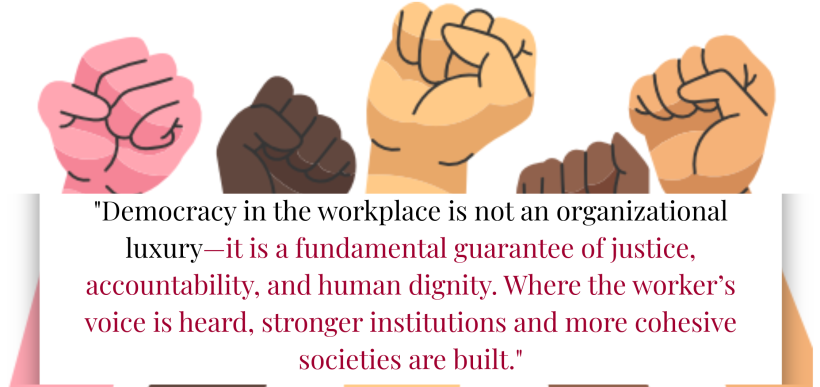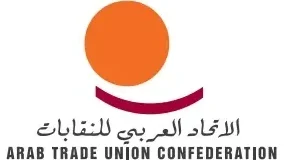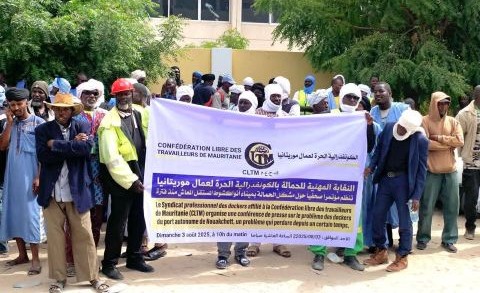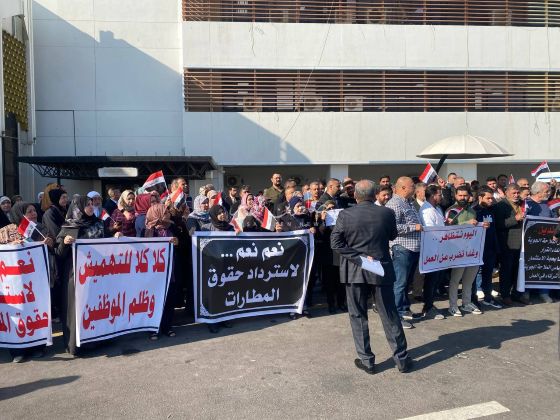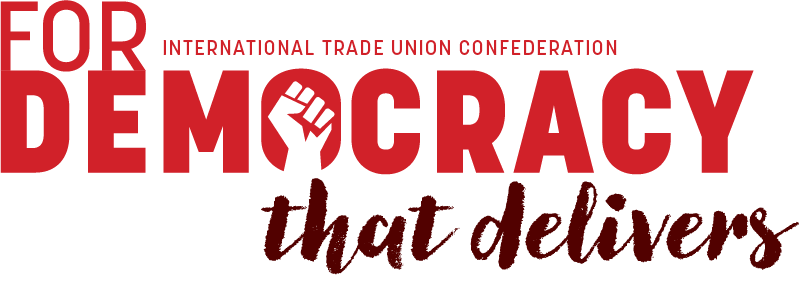
Strengthening Democratic Governance, Social Justice, and a Just Peace in the Arab Region
Building a democratic state rooted in strong institutions requires steadfast adherence to the rule of law, the principles of good governance, and the promotion of transparent and accountable public administration. The effectiveness and integrity of public institutions must be ensured through comprehensive anti-corruption measures, independent oversight mechanisms—both official and civil—and the reinforcement of inclusive citizenship and social justice.
In the Arab region, this entails reforming governance systems to uphold transparency, ensure equitable access to public services, decentralize decision-making, and foster political pluralism. It also requires enabling civic participation and guaranteeing the independence of the judiciary, electoral institutions, and public oversight bodies. Democratic renewal cannot succeed without the active participation of all stakeholders, including trade unions, civil society, and marginalized populations.
Fundamental Freedoms and Access to Information
Freedom of expression and of the press, as well as the right to access information, are fundamental to democratic governance. These freedoms serve as essential tools for ensuring transparency, confronting all forms of authoritarianism and corruption, and holding institutions accountable. Their protection is indispensable for the rule of law and must be enshrined in national legislation and aligned with international human rights standards.
The continued use of censorship, surveillance, and the restriction of civic space in parts of the Arab world threatens the foundation of democratic life. National governments must adopt access-to-information laws, protect independent media, and uphold the right to peaceful protest. Public access to governance data and fiscal transparency is essential for inclusive and rights-based development.
Guaranteeing Trade Union Rights as Democratic Foundations
The respect for individual and collective rights lies at the heart of any genuine democratic order. The rights of workers to organize freely, engage in collective bargaining, participate in social dialogue, and express political pluralism are indivisible and must be fully safeguarded. Trade union rights are essential to the realization of social justice, inclusive economic development, and democratic accountability, and must be upheld in accordance with international labor conventions, including ILO Conventions 87 and 98.
Trade unions in the Arab region face persistent restrictions, from legal constraints to political repression. In this context, the right to unionize, strike, and bargain collectively must be not only legally recognized but actively protected. Governments must promote inclusive and institutionalized social dialogue mechanisms that involve trade unions in shaping national development agendas, labor legislation, and peacebuilding processes.
A New Social Contract for Social Justice and Economic Transformation
The Arab region is characterized by widespread unemployment, informality, growing inequality, and gender-based exclusion. To respond to these challenges, a new social contract is required—one that guarantees decent work, universal social protection, fair taxation, and equal economic participation.
Trade unions call on Arab governments and international partners to invest in policies that prioritize employment creation, especially for youth and women; ensure a living wage for all; and extend social protection floors. Social justice must be embedded in fiscal and economic planning, and unions must be fully involved in designing and monitoring these policies. Regional development and financial institutions should reorient mandates to support inclusive growth, just transitions, and equitable redistribution.
Corporate Accountability and Digital Labor Protections
Multinational corporations and digital platforms increasingly operate across Arab markets with little regulation or accountability. Binding corporate due diligence laws are urgently needed to ensure companies respect human rights and labor standards across supply chains.
Arab states must establish frameworks for platform work that guarantee fair pay, health and safety, union rights, and social security coverage. A binding international treaty on corporate accountability, as called for by the global labor movement, must be supported and ratified by governments in the region. Trade unions also call for regional dialogue on regulating the digital economy to prevent new forms of worker exploitation.
Just Transitions for Climate and Digital Transformation
The Arab region faces significant risks from climate change and rapid digitalization. Trade unions stress that the ecological and technological transitions must be just, inclusive, and union-led. This means investing in green and digital jobs, ensuring skills development, and embedding union participation in climate and technology governance.
Governments should commit to tripartite climate dialogue, green industrial policies, and public investment in renewable energy, sustainable transport, and circular economies. National digital strategies must address data rights, job displacement, and equitable access to infrastructure and training, particularly for youth, women, and marginalized communities.
Advancing a Just and Sustainable Peace through International Law
A just and lasting peace in the Arab region remains unachievable so long as the Israeli occupation of Palestinian territories continues and the occupying power persistently violates international humanitarian and human rights law. Peace cannot be sustained in the absence of justice, accountability, and respect for international legal obligations.
The pursuit of international peace and security must be guided by binding international jurisdiction, grounded in the UN Charter, and reinforced by impartial multilateral mechanisms. The current global security framework must evolve to ensure that justice prevails over geopolitical power imbalances. Regional peacebuilding must prioritize inclusive political processes, demilitarization, and the reduction of arms proliferation, in full alignment with international norms and collective security frameworks.
Trade unions affirm their role in promoting peace through cross-border solidarity, inclusive dialogue, and advocacy for disarmament and demilitarization. Occupation, militarization, and foreign interference must give way to the rule of law, international accountability, and self-determination.
A Unified Trade Union Call for Democratic Renewal in the Arab Region
The Arab trade union movement fully aligns with the global campaign For Democracy That Delivers and commits to advancing:
- Legal guarantees for union rights and civil liberties
- A new social contract centered on decent work and equity
- Regulation of corporate and platform power
- A just transition for digital and climate transformation
- Binding international frameworks for peace and accountability
Democracy, development, and peace must be built with and for workers. Trade unions must be recognized as strategic partners in shaping a just, democratic, and resilient future for the Arab region.
